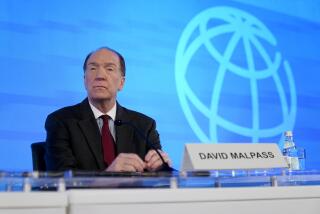The World Bank Works
- Share via
Treasury Secretary James A. Baker III has made a persuasive case to Congress for U.S. support of the $74.8-billion general capital increase for the World Bank. There is no better way to leverage a relatively few American dollars into an immense contribution to the stability and development of Third World nations.
World Bank loans are not subsidized. They are made on a commercial basis, generating a profit that is reinvested at the discretion of the member nations. Most of the money is borrowed on commercial markets, with repayment guaranteed by the 151 member governments. The U.S. share, largest of all the members, is 18.75%. Under the new replenishment, the members will pay in only 3% of the total, with the balance callable. In its 42 years of operations, the bank has never had to call up any of that reserve capital. Until recently, when Nicaragua fell behind in paying on its loans, the bank had never had to set aside funds for a loan loss reserve. Even now, with seven members in arrears, their accumulated obligations are less than 3% of outstanding loans, an enviable record.
The bank’s role is particularly attractive at a time when congressional efforts to control the federal deficit have pinched foreign aid. The actual U.S. payment will be $70.1 million a year over the next six years. But with private-sector borrowing, the bank will be able to expand its loans from about $15 billion a year to $20 billion a year.
Apart from the clear foreign-policy goals achieved by the program, there are narrower interests of particular advantage to the United States, according to Baker. U.S. firms are beneficiaries of World Bank procurement contracts, receiving a total of $1.6 billion last year alone. A number of nations of particular concern to the United States, including the Philippines, Indonesia, Pakistan, Turkey and the principal nations of Latin America, are major recipients of World Bank loans. And American banks stand to benefit from what Baker called “an essential role” the bank plays in helping resolve the international debt crisis.
Despite all these obvious advantages to the United States, however, there remains opposition within Congress. Agricultural interests have seen bank loans to developing nations as creating competition for the United States despite research that demonstrates that American farm exports grow where developing nations’ own farm production grows. Some manufacturing and mining interests have sought to limit World Bank funding for any enterprise seen as competing with the United States, a prescription for global economic stagnation, with all of its negative consequences for American exports.
There has also been concern in Congress about World Bank loans to projects that have damaged the environment. That is now being corrected under the firm leadership of the new World Bank president, Barber B. Conable, a respected former member of Congress from New York.
The Reagan Administration has given a high priority to winning congressional support for the capital increase for the World Bank. So it should. There is no better way to accelerate development in Asia, Latin America and Africa. That is clearly in the U.S. national interest.
More to Read
Sign up for Essential California
The most important California stories and recommendations in your inbox every morning.
You may occasionally receive promotional content from the Los Angeles Times.













